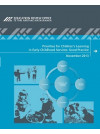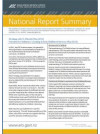This national report is one of two reports that present the findings of a 2012 national evaluation about curriculum priorities. A summary of both reports is available below – it provides a snapshot of what we found as well as some self-review questions and indicators for early childhood services.
Methodology
Overall evaluation question
How effectively are early childhood services across New Zealand determining, enacting and reviewing their curriculum priorities to support education success for every learner?
ERO gathered information during regular education reviews in 387 early childhood services during Terms 1 and 2, 2012. ERO asked the following key questions in each service:
- How does this service determine its curriculum priorities and emphases for children’s learning?
- To what extent are this service’s curriculum priorities and emphases for children’s learning enacted?
- How effectively is this service implementing its curriculum to support children’s learning?
ERO also gathered data from 240 services in Term 3, 2012. In these services ERO asked:
- What are the service’s curriculum priorities and emphases for children’s learning?
- What are the links between the service’s curriculum and the principles and strands of Te Whāriki?
- What other influences impact on the service’s curriculum?
- How is the service’s curriculum (including its priorities and emphases) influenced by children’s strengths, interests and abilities; and to changes to the actual children enrolled?
Appendix 2 includes some investigative prompts and a rubric used in the evaluation which may be useful for services’ self review.
Data collection
During each service’s review, ERO collected information from a variety of sources including:
- discussions with managers and teachers at the service
- informal discussions with parents and whānau
- documentation related to the operation of the service and children’s learning.
Appendix 3 has more information about the samples. All data was collected by ERO review officers in the normal course of their review activities.


